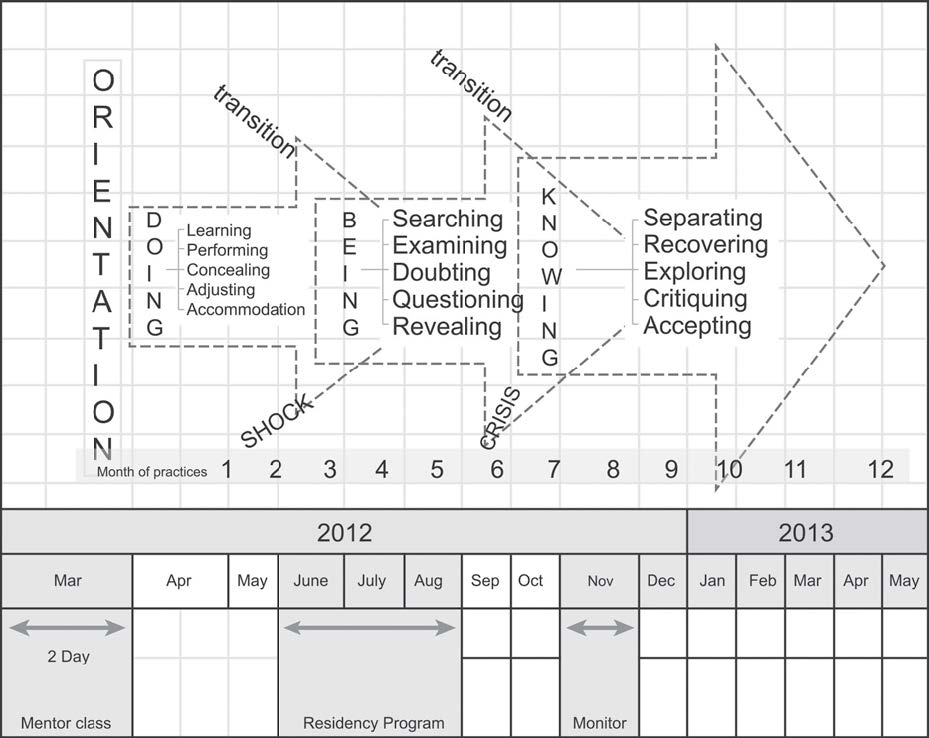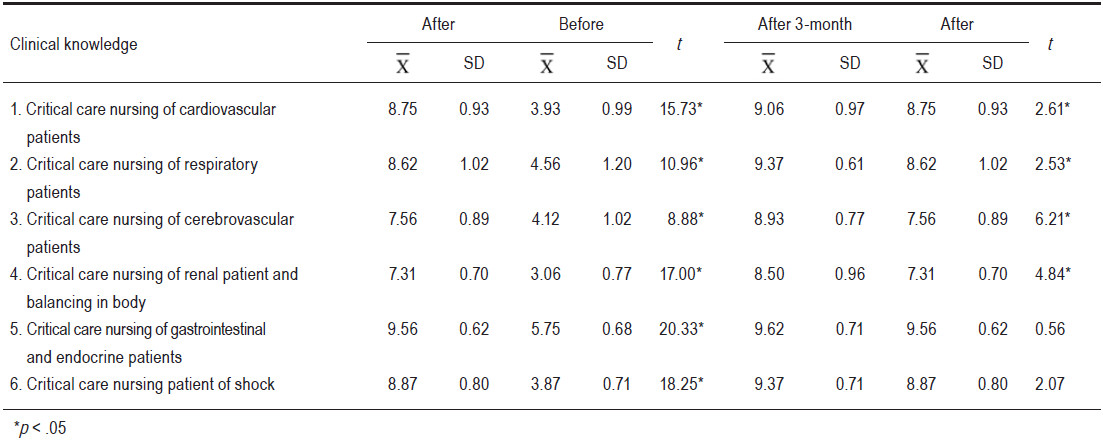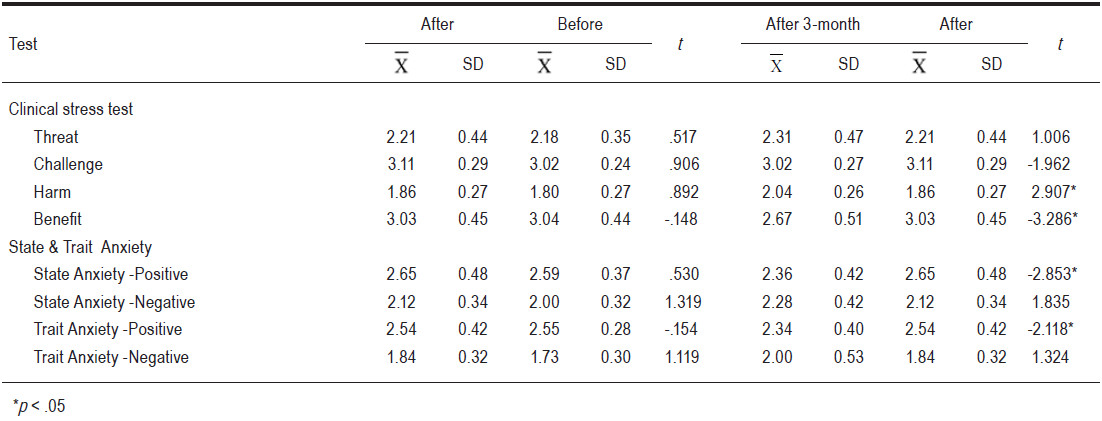Nowadays,almost all health organizations do not have sufficient registered nurses (RNs) taking care of patients. This problem occurs around the world, not only in Thailand, and affects the efficacy of nursing services because RNs are an important staff component for the delivery of hospital services. As a result, the lack of RNs impacted the economy negatively because it is necessary to fund and train new graduate nurses to become a RN. A RN is then able to care for patients while keeping safety as a first priority.
With regard to jobs of new graduate nurses, they have to face an ever-changing atmosphere of a new workplace, the hospital’s systems, rules and policies. These all affect the work of new graduate nurses. Some of the nurses may be able to adapt to the new workplace but many find it difficult. As a result, the latter are likely to quit in their first year of work.1,2 The role transition from a student nurse to a RN is a challenge. In a hospital context, this transition is the first step of their duties. Being a RN is recognized as being more stressful than being a student nurse working under the supervision of a nurse instructor. Therefore, student nurses who become RNs have to adapt themselves to a nursing society and adjust their minds in order to work as RNs efficiently.
In addition, RNs are required to follow the rules and regulations of their new workplace. If they fail to do so, they will be worried and stressed as well as run the risk of losing their self-confidence. In other words, if they are not able to perform work tasks assigned to them by senior nurses or if they cannot manage to provide adequate care to patients under their own authority, they will lose self-esteem. This in turn will affect the quality of care for patients. After a bad attitude about being a RN emerges, this might result in the nurses taking a day off, quitting, transferring, abandoning their posts or even resigning from their jobs. This problem can become an obstacle for the advancement of their nursing career as well as affecting them negatively both physically and mentality. ‘Reality Shock’ at the beginning of a nursing career is important to recognize because it impacts a nurse’s confidence, job stability, willingness to work and can lead to interpersonal conflict.3 In addition, a new workplace can be a shock to new graduate nurses. If new graduate nurses compare their expectations of a workplace and their actual reality, they will be more likely to quit their job.4 ‘Reality Shock’ is a transition period when a student nurse becomes a RN which can be divided into 4 periods3 which are: the Honeymoon Phase, the Shock Phase, the Recovery Phase and the Resolution Phase. The transition can be exemplified as a step in becoming a RN, divided into 3 phases4: Doing,Being and Knowing (see Figure 1).
Although a large number of new graduate nurses are recruited, many other nurses will quit in their first year of a career too.5 Even though some organizations arrange preceptor nurses to assist new graduate nurses in their first 3 months, it negatively impacts on the organization’s budget for training and diminishes the workforce that drives the organization forward. Preceptorship programs or mentoring programs help new graduate nurses to work and it increases the staff retention rate from 62% to 92%.7 In contrast, some organizations do not have this program and hence new graduate nurses cannot do their work efficiently and they eventually quit. To sum up, preceptor nurses are crucial to the training of new graduate nurses because they help the apprentices to overcome obstacles in the beginning of their career.6,7
The way to overcome ‘Reality Shock’ is to establish a program that helps new graduate nurses to be able to enter the nursing career, reducing stress (see Figure 1) and, especially, preventing them from resigning.2,4,8-11 The program is called “Nurse Residency Program” or “NRP”. The researcher works in the human resources development department of the nursing division, and states that the turnover rate of new graduate nurses in private tertiary level hospitals is more than 50% in the first year of the nurses’ career. Moreover, in Thailand, there is still no NRP and this is the reason why the researcher intends to establish a training NRP as part of the pathway of a student nurse to becoming a registered nurse.
Example Before Object After 3-month after
A O1 X O2 O3
Methodology
First: To study the work problems of new graduate nurses.

Figure 1: Shows period of nurse residency program (NRP) and related mentoring program.
Second: Design the Nurse Residency Program to train new graduate nurses.
1. Synthesize the data gathered from the study of new graduate nurses’ work problems, interviews with hospital executives and the ICU manager to create the Nurse Residency Program and Mentoring program.
1.1. Mentoring program for preceptor nurses:
- New graduate nurses’ work problems.12,13
- Preceptor nurses’ role.12,13
- Methods to manage stress, roles and duty of preceptor nurses, apply to on the job training (OJT), encourage leadership and communication and evaluation of new graduate nurses’ work performance.
- Game to encourage new graduate nurses.
- Activityandtrainingofpreceptornurses’training program consisting of lectures, brainstorming activities, clinical teaching in bedside care using the OJT method.
- Preceptor nurses’ evaluation and aptitude testing.
1.2 Nurse Residency Program: NRP for new graduate nurses:
- New graduate nurses’ problems on clinical know- ledge, nursing skills, anxiety adjustment, leader
- ship and communication. Integrated course:2,4,9-11
- Increase new graduate nurses’ ability to solve their work problems.
- Increase new graduate nurses’ development of clinical knowledge, nursing skills, success in adjusting themselves to new work environments, improved stress management, leadership and communication. Course description consists of six fields of clinical knowledge such as: nursing for intensive care patients of cardiovascular, respiratory, cerebrovascular, renal patient and balancing in body, gastrointestinal and endocrine system as well as shock-phase intensive care patients for 64 hours or eight days and seven fields of nursing skills such as use of ventilator, suctioning, and intravenous interventions. This training for nursing skills takes 56 hours or seven days. In addition, there is 24 hours (3 days’) training for new graduate nurses to help them to adjust to new work environments and improve their stress management. Then, new graduate nurses have to train to improve their leadership and communication skills. For example, they need to know how to write nurses’ notes, and how to work collaboratively as well as learning from case studies.
- Activities include lectures, OJT, games, brain storming acti , discussions, learning from case studies through media such as handouts, slides, video clips, medical devices and patients’ files.
- Evaluation for the program is carried out by observing new graduate nurses’ working problems from four perspectives using four tools:
• Clinical knowledge: A 60-question test in 6 subjects before and after training and also 3 months after training.
• Nursing skills: competency assessment skills checklist, before and after training and also 3 months after training.
• New graduate nurses’ skills for adjusting themselves to the work environment: Pagana’s Clinical Stress Questionnaire17 and Spiel- berger’s State-Trait Anxiety Inventory18, before and after training and also three months after training.
• Leadership and Communication: Casey- Finkgraduatenursesurvey1, beforeandafter training and also three months after training.
2. Present the program’s structure to five experts in order to approve the structure and verify that it is relevant and appropriate.
3. Use comments from the experts to improve the program.
Third: test the program:
1.Test the approved program through the:
1.1. Mentoring program tested by 20 ICU nurse volunteers. There were two days of pre-test and post-tests.
1.2 Nurse Residency Program tested by 20 new graduate nurses who work full-time in the ICU. The training took place every Thursday and Friday, over nine weeks, for a total of 21 days. There were pre-tests and post-tests as well as a post-test three months after the training finished.
The four tools used for research were:
The research results showed new graduates nurses’ work problems from four perspectives:
The NRP and Mentoring training programs were found to be appropriate and at a high level and the highest level and congruence for all factors. The results after the Mentoring training program compared to before and after participating in the program was found to be a statistically significant level of 0.05 and the NRP training program was found to significantly increase clinical knowledge when compared between levels before training and three months after training, apart from critical care nursing of Gastro-intestinal and Endocrine patients as well as the patients with shock (Table 1). These remained the same. The competency of nursing interventions was found to be higher after training. After three months of training this competency was higher than after training at the statistically significant level of 0.05 (Table 2). Anxiety adjustment before, after and after three months of training remained the same (Table 3). The leadership and communication, before, after and after three months of training remained the same as well (Table 4). After new graduate nurses have been trained in the Nurse Residency Program, they have more clinical knowledge, better skills than before and are able to adjust their anxiety about their workplace. During the research period, there were four of 20 new graduate nurses who resigned. So, in the first two months, there were 16 new graduate nurses who were still eligible for the study.
Table 1: Result of clinical knowledge test compared before and after, after and after 3 months program implementation (n = 16).

Table 2: Result of nursing practice skill compared before and after, after and after 3 months program implementation (n = 16).

Table 3: Result of clinical stress and anxiety test compared before and after, after and after 3 months program implementation (n = 16).

Table 4: Result of leaderships and communication competency compared before and after, after and after 3 months program implementation.

This research found that most new graduate nurses felt a profound lack of preparation for their new role. Problems included: being able to write nurses’ notes, nursing practices and other issues. When student nurses were incorrect, their nurse instructor would remedy the errors and explain. Preceptor nurses are needed to supervise new graduate nurses at the beginning of their registered nurses’ career. As a registered nurse, they may get someone to review, coach on critical thinking, improving clinical judgment, nursing processes and many other areas in order to prepare for their role. Although they had a preceptor assigned to them for coaching for a time, they need more supervision. They also feel worried and insecure13, 14 that they will not be able handle pressure. So, they always have to consult their preceptor nurses.12-15
This aspect of training was a simulator for new graduate nurses to find solutions if they feel stressed. A new job in a new environment can make people stressed and each person will have a different reaction when they are stressed.16 Hence, each nurse should eliminate stress in their own way and try to understand problems they have to encounter.
Furthermore, it was found that new graduate nurses have a problem about leadership and communication. Sometimes they lack the confidence to work collaboratively and to solve unexpected problems. Most of them cannot make others understand them even though communication is a way to make friends among colleagues. They should be friends with their colleagues. There were some group activities for new graduate nurses to help them to get to know each other. They cannot communicate efficiently because they do not have much work experience and hence they may feel nervous to communicate with others. New graduate nurses’ problems might be solved by the supervisor of their preceptor nurses. A new graduate nurse’s ability to adjust to the work environment is also important. Being a nurse in an ICU requires an under- standing of the needs of their patients and their families.
Also their stress levels did not change after the end of the training. Actually, the moment that new graduate nurses felt the most stressed was when they have taken care of patients and the patients’ symptoms change. Therefore, the program has simulated activities for new graduate nurses, aiming for them to be able to deal with stress well.9-11 The stress of new graduate nurses in the 3 periods assessed remained the same. Actually, they are mostly generation Y people who like to learn new things and are very confident. In the ‘being’ period, new graduate nurses will try their best to adjust themselves to the work envi-ronment, and deal with their intrapersonal conflict and have positive thinking and try to accomplish their goals.4
Evaluation of this program showed that new graduate nurses have more clinical knowledge in the six aspects after they received training. They also improved more in four aspects (except for caring for patients who need care in gastrointestinal and endocrine as well as patients who were in shock phase) after the training program ended for 3 months because their intensive care unit did not assign these 2 tasks to new graduate nurses because it was too dangerous for them to take care of patients with severe conditions. It showed that training and assigning work tasks for them can improve new graduate nurses’ clinical knowledge after they have been trained in this program.
This research suggested the program’s length should be six months in order to cover the ‘reality shock’ period of new graduate nurses. Before training in this program, new graduate nurses should have work experience of 3-6 months. Moreover, the program’s length should be one year in order to maximize the quality of training. Elements in the training program should be in accordance with problems that happen in the real lives of new graduate nurses.